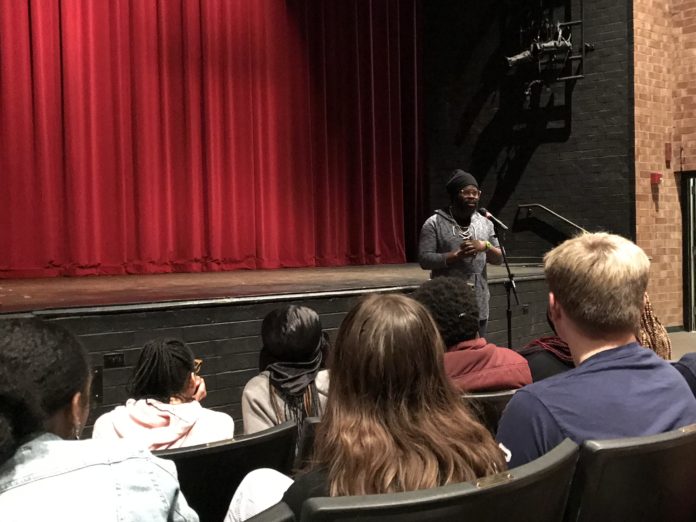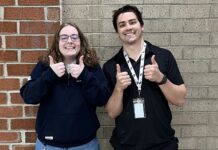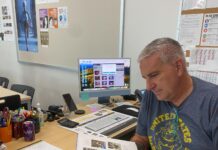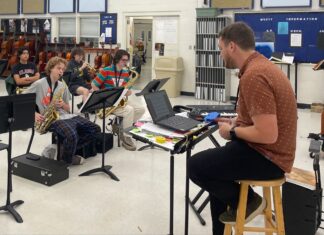
A crowd of Chapel Hill student leaders lowered their discussions to a quick silence, turning their heads to face the lighted stage of Hanes Theatre, captivated by words that rang familiar: “It’s a beautiful day in the neighborhood. A beautiful day for a neighbor.”
As Chapel Hill’s poet laureate C.J. Suitt gently sang out the words to the theme of Mister Rogers’ Neighborhood, the silence was replaced with a rare connectivity, a shared comfort of sorts. Everyone in the building—whether student or teacher, black or white—knew the refrain.
Suitt, a Chapel Hill High School alumnus who graduated in 2005, then launched into a stark poem, titled “Lovely Little College Town,” about Chapel Hill’s progressive facade.
Students showed their approval with a small cluster of snaps, allowing Suitt to continue his blistering poem without stopping his rhythmic flow. He grabbed the attention of every student: no one was continuing discussions or flipping through their phones. All eyes were on him.
What was just the introduction Chapel Hill Town Council presentation on February 5, organized by English teacher Michael Irwin, was met with roaring applause, a welcome from the students of Chapel Hill High School.
A prominent number of these students were from the school’s Student Government, Youth Leaders Institute (YLI) and DRIVE Workshops, educational support networks that aim to improve student outcomes.
When the applause subsided, Town Council Member Allen Buansi took center-stage, telling stories from his time at East Chapel Hill High School and what led him to his role as an attorney-fellow at the UNC Center for Civil Rights.
Buansi settled in Chapel Hill after moving around for most of his childhood. He attended Dartmouth College, where he earned his bachelor’s degree, and went on to complete his law degree at the University of North Carolina School of Law.
“There is a disregard from the system about how [test] scores can affect a student’s life, how they will carry that ranking for the rest of their life,” Buansi said, speaking about racial achievement gaps and the negative effects of standardized testing.
He further stated that racial achievement gaps impact a wide variety of areas, not solely rural areas and the deep South.
“You hear a lot on the news about places like Alabama that have issues that go back to Jim Crow,” he said. “In Chapel Hill, we’re not immune to that.”
The next speaker was Tai Hyunh, a senior at the University of North Carolina at Chapel Hill, studying computer science and business management, as well as a member of the Chapel Hill Town Council.
Huynh answered various questions from students, and facilitated discussion about affordable housing and education in the Chapel Hill area, two of the main topics that were suggested by students during the presentation.
“I’ve been involved in activism and affordable housing advocacy since I got to Carolina, and it did not take me very long to see that our town says a lot of things and writes down a lot of things, but we never really put our money where our mouth is,” Hyunh said.
The final speaker was Quintin Harper, who works with the Inter-Faith Council (IFC) for Social Service in Carrboro and Democracy North Carolina. IFC’s new program, Activate, aims to inform and engage historically marginalized communities and bring them into the civic process.
Harper added to the discussion about affordable housing by providing an anecdote about his time working on Barbara Foushee’s campaign for the Chapel Hill-Carrboro Board of Alderman in 2017, which was centered around affordable housing and making the community more inclusive of all people living in it.
Through this campaign, Foushee received the most-ever votes in Carrboro and successfully elevated and created the Affordable Housing Advisory Commission.
Harper continued his speech by talking about what is necessary for effective leadership.
“When you look around, it is not so much ‘I’ as it is ‘we’,” he said. “Leadership is looking around and seeing who is not in the room, looking around and seeing whose voice is not present and looking around seeing whose ideas are not being represented at this table.”











